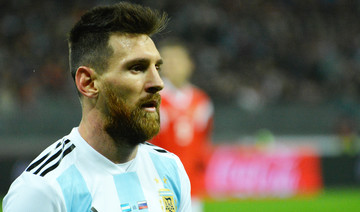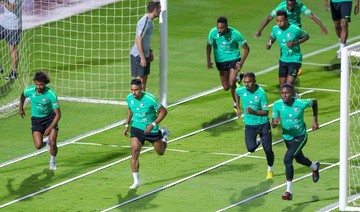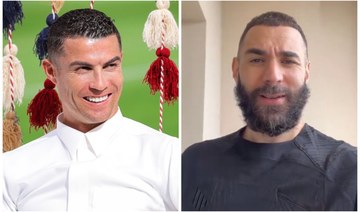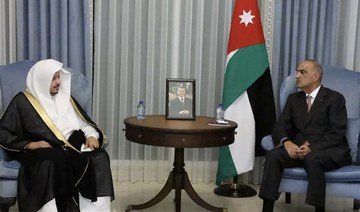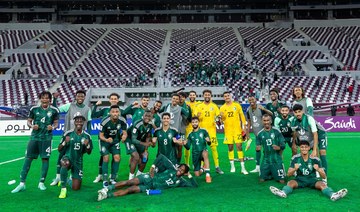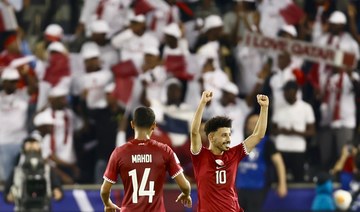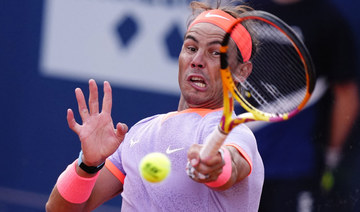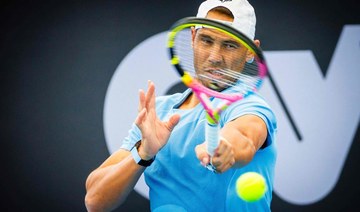JEDDAH: This weekend marks the one-year anniversary of Turki Al-Sheikh’s appointment as chairman of Saudi Arabia’s General Sports Authority (GSA), a nomination that kicked off a year of unprecedented sporting achievement and historical events in the Kingdom.
Along with his responsibilities as GSA chief, Al-Sheikh is chairman of the board of directors of the Saudi Arabian Olympic Committee, the Islamic Solidarity Sports Federation, and the Union of Arab Football Associations.
Since Al-Sheikh’s nomination in September last year, the GSA has launched a series of notable public initiatives in exercise and sport. In addition, Al-Sheikh has been instrumental in putting pen to paper on a host of lucrative multi-year contract deals with some of the largest sports entertainment organizations in the world.
At the top of the list of social initiatives that fall in line with the Kingdom’s Vision 2030 has been the GSA-established Mass Participation Federation, the main body responsible for increasing public participation in exercise and sports in the Kingdom.
After a disappointing 2015 national sports survey showed only 13 percent of Saudi citizens aged 15 and over exercise at least once a week, extensive national exercise and sporting campaigns were established to raise public awareness on the benefits of exercise and sport.
Earlier this year, another national sports survey was conducted under identical conditions and methods, with the data revealing an encouraging increase to 23 percent, surpassing the GSA’s interim Vison 2030 target of 20 percent by 2020.
Princess Reema bint Bander, appointed president of the Mass Participation Federation in October 2017, commented on the positive increase in public health: “The improvements reflect the societal changes in culture and attitudes led by the Vision 2030 transformation and the support of Saudi women, as a lot of women are now more open to engaging in exercising and physical activity.
“It’s important to recognize that this is a family movement. Men and women, boys and girls, young and old, are responding and are proving — as we believe at the GSA — that sport is for all.”
The GSA has also been heavily involved in providing growth and support for the country’s national sport of football. In January this year, a Saudi-La Liga partnership saw nine of the finest Saudi players being transferred on loan to seven Spanish clubs in the top two divisions of the Spanish Football League.
The deals were mutually beneficial and served to provide a future avenue for Saudi Professional League players to gain vital footballing experience in one of the top leagues in the world.
In May, the GSA, along with the Saudi Football Federation, announced that Crown Prince Mohammed bin Salman would cover all external debts owed by Saudi clubs, a figure estimated at $340 million. It was welcome news to all teams since the issue of debt had long hindered the growth of football in the country.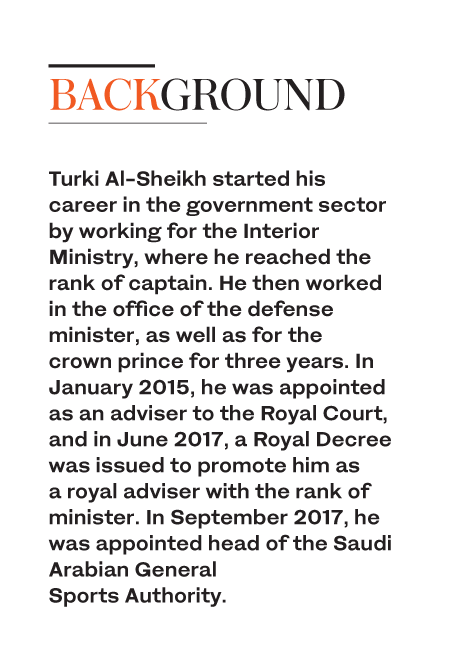
In March, the GSA in cooperation with the Saudi Arabian Federation for Electronic and Intellectual Sports organized the 1st GSA Esports Cup. More than 2,000 players from around the world took part in the mega-event over three days. Electronic and intellectual sports have been flourishing in Saudi Arabia this year. In April, the first National Baloot Championship was held in Riyadh. Over 12,000 players participated in the popular card game for prizes totaling nearly $300,000.
In August, Saudi Mosaad Al-Dossary won the EA Sports FIFA eWorld Cup held at the O2 Arena in London. From an original pool of over 20 million contestants worldwide, “Msdossary” claimed the cup and $250,000 in prize money. He was the second Saudi to claim the title after Abdulaziz Alsheri won the 2015 edition.
The end of April saw arguably the biggest sporting extravaganza in Saudi Arabia this year. Al-Sheikh welcomed the heads of the WWE to the Kingdom, negotiating an extensive 10-year contract to bring WWE shows to Saudi Arabia on an annual basis. The “Greatest Royal Rumble” was the inaugural show held in Jeddah. A historical event at King Abdullah Stadium saw all seven WWE titles defended in front of over 60,000 men, women, and children.
August brought another world cup tournament and, with it, the crowning of Saudi Arabia as world champions once again. The INAS World Football Championships for athletes with intellectual disabilities held in Sweden saw an inspirational Saudi team sweep the competition emerging victorious over football powerhouse Argentina 2-0. It was an unprecedented fourth INAS cup win after successes in Germany in 2006, South Africa in 2010, and Brazil in 2014.
Al-Sheikh was quoted saying: “We are so proud of the team’s achievement. They are an inspiration for all of Saudi Arabia of what can be achieved through dedication and hard work. There is no challenge that cannot be overcome.”
This achievement served as a testament to the GSA’s mission to create an all-inclusive Saudi culture where men, women, and children all prosper regardless of intellectual or physical handicaps.
August also witnessed the Saudi National Team of Equestrian Jumping win the gold medal at the 18th Asian Games in Jakarta.
This month of September brings with it one of the most anticipated boxing title fights in recent memory, as George Groves defends his WBA super-middleweight title against Callum Smith at King Abdullah Sports City in Jeddah on Sept. 28.
December wraps up the GSA’s 2018 calendar year of sporting events with Saudi Arabia set to host the season opener of the all-electric Formula E’s 2018-19 motor racing series. Riyadh’s Ad Diriyah district will mark the historical debut of Formula E in the Middle East, after the city-based series reached a 10-year agreement with the GSA and the National Motor Federation.
The Saudi Arabian government’s plan to diversify its economy away from oil received a massive boost from its sports entertainment sector this year.
Helping to steer this economic shift has been none other than Turki Al-Sheikh. The CEO of the General Sports Authority continues to strive to bring some of the world’s biggest sporting events to the Kingdom.
If 2018 is a sign of things to come, the Saudi public should brace themselves. Next year will surely be just as memorable.
Field of dreams: Turki Al-Sheikh’s year of sporting triumphs
Field of dreams: Turki Al-Sheikh’s year of sporting triumphs

Juventus ordered to pay Ronaldo $10.4 million in back salary
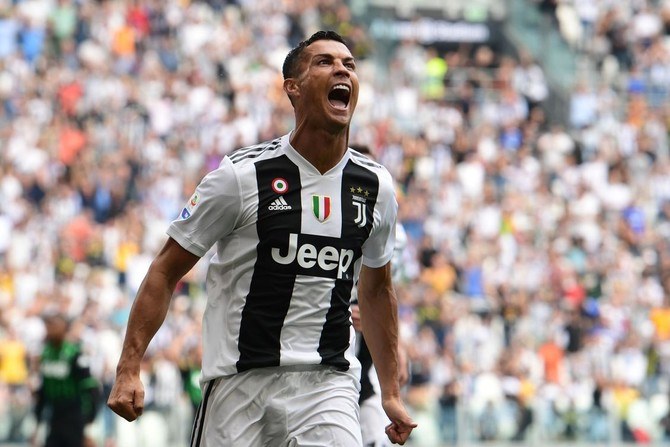
- The five-time Ballon d’Or winner was the world’s highest-paid sportsman in 2023, with $136 million, including $46 million in wages
Rome: Juventus must pay Portuguese star Cristiano Ronaldo 9.7 million euros ($10.4 million) in back wages for the 2020-21 season, the Italian courts announced on Wednesday.
The Court of Arbitration, to which Ronaldo appealed, “orders Juventus Turin to pay the sum of 9,774,166.66 euros,” plus interest and procedural costs, it stated in its decision.
The sum equates to the difference between the salary actually received by Ronaldo and that which he should have received after tax and other deductions.
Ronaldo, who spent three seasons in Italy with Juventus (2018-21) before joining Manchester United (2021-22) and then the Saudi club Al Nassr, was claiming 19.5 million euros but the arbitration panel reduced that by 50 percent.
Contacted by AFP, Juventus declined to comment, but said it would be issuing a statement “shortly.”
According to the rankings drawn up by the American business magazine Forbes, the five-time Ballon d’Or winner was the world’s highest-paid sportsman in 2023, with $136 million, including $46 million in wages.
Juventus, who are listed on the stock exchange, recorded losses of 123.7 million euros in the 2022-23 financial year, which ran to the end of June, it announced in October.
No provision has been made in the accounts of Italian football’s most successful club, currently third in Serie A, for the payment of this wages backlog.
Marketing as much behind expansion of Asia Cup as merit
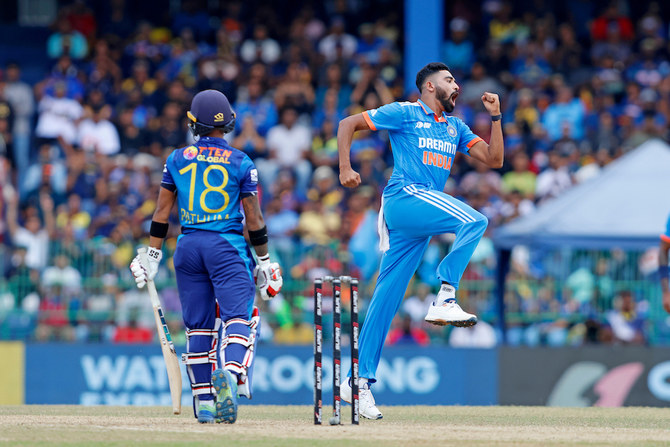
- Non-cricket fans may struggle to comprehend the links between the Asia Challenger Cup, the Asia Premier League and the Asia Cup
MUSCAT: Even to cricket aficionados — sometimes referred to as badgers — the various ways teams can qualify for the world’s major tournaments might appear opaque.
As may the term “badger”. Badgers are known for their tenacity, focus and persistence, qualities which can apply to those who dedicate chunks of their life to the game, its history, statistics, spectating, discussion and administration. This is not a complete list, but it provides a flavor.
A test case for tournament opaqueness is the Asia Cup. Non-badgers can be forgiven if they fail to comprehend the links between the Asia Challenger Cup, the Asia Premier League and the Asia Cup. They all fall under the aegis of the Asia Cricket Council and their existence represents an attempt by the organization to provide a more coherent regime for qualification into the big event — without using the word “qualification.”
The situation was much simpler in 1983, when the ACC was founded with the aim of promoting goodwill between Asian countries. In 1984, the first edition of the Asia Cup was held in Sharjah, where the ACC was based. It was One Day International in format and India won, but then boycotted the 1986 event because of strained relations with Sri Lanka. Strained political relations with India caused Pakistan to boycott it in 1991 event, whilst the 1993 cup was cancelled for the same reasons. Sadly, the ACC’s original aim was sorely tested almost from the outset.
Subsequent tournaments did not fit any regular temporal pattern. It was not until 2009 that the tournament was regularized onto a biennial basis. In 2015, the ACC announced the tournament would be played on rotation between ODI and Twenty20 International formats. Despite the introduction of a group stage to allow a slight expansion in the number of teams, the tournament has normally had only six competitors.
The International Cricket Council’s decision in April 2018 to grant T20I status to all 104 member nations – both men’s and women’s teams - has had far-reaching effects on cricket, including the Asia Cup. The number of countries with teams playing formalized T20 cricket at international level has grown rapidly.
It could be argued that the decision democratized cricket for both men and women. The 50-over ODI format requires a longer commitment and a deeper allocation of resources beyond the means of many of the boards administering cricket. T20 cricket offered a quicker, less resource-intensive route for the teams of associate member countries to test themselves not only amongst their peers, but also against the full members on the pitch. It has become a format for the many, not the few.
However, there remains a huge gulf between funds available to associate members and full members. This situation is exacerbated by the ICC’s decision-making regime which allows very little representation for associates. In the latest, 161st edition of the Wisden Almanack, its editor berates last year’s decision to increase the Board of Control for Cricket in India’s share of ICC’s central funds from 25 to 38.5 percent. It is not as if it needs the funds.
The BCCI argues that, since it brings the lion’s share of revenue into the game, it should be proportionately rewarded. This argument suggests a desire to control other members rather than encourage their development. Wisden’s editor asks: “Is it really beyond the wit of the administrators to distribute cash according to need, not greed?” By way of example, the West Indies cricket board receives just under 5 percent of ICC central funds. No wonder its premier players frequent the game’s franchise leagues.
The views of Wisden’s editor will probably be regarded in cricket’s power circles as a rage against the dying of the light for a previous regime, governed from England. Whilst it is true that regime was as concerned with its own protection as the current one, its idea of spreading the game was somewhat parochial. It is in that context that the ICC’s mission to spread the game should be seen. Now, cricket is not only played internationally in countries which raise the eyebrows of many when the name is mentioned, it is also accompanied by grass roots growth.
Given the recognized closeness between the ICC and the BCCI, whose secretary is also president of the ACC, the motives for restructuring the Asia Cup are worth exploring. If it is accepted that T20I cricket has the potential to provide a more level playing field, at least in terms of recognition of performance to a global standard, then the competitive structures should encourage meritocracy. This does lead to criticism that the breaking of records by associate players dilutes those set by full member players. There was such an example in Oman this week when Nepal’s Dipendra Singh Airee hit six sixes in an over, no mean feat in any standard of cricket.
This achievement will have set off the cricket badgers. One remarkable coincidence is that the umpire at the bowler’s end had also stood on another occasion when six sixes had been struck in an over. The badgers should also reflect on the possibility that the Asia Cup structure made this possible. At the base of the three-tier structure is the Asia Challenger Cup, from which two teams progress to the second tier, the Premier Cup. The winner of that is elevated to the Asia Cup with the full members. The pathway provides every ACC member with a chance to strive for this nirvana.
Yet the structure is not just about merit, it is also about commercial opportunity. Three stand-alone competitions offer the opportunity, it is argued, for each to be marketed separately, thus increasing their commercial potential. The most visible sponsorship at both the Challenger and Premier Cups has been by DafaNews and 1XBet, plus FanCode. This is sponsorship of a highly specific, and in some eyes potentially contentious, nature. Badgers may need to be tenacious in rooting out the relationship between the new Asia Cup structure and its sponsors.
Kuwait fall to Vietnam in 2024 AFC U-23 Asian Cup
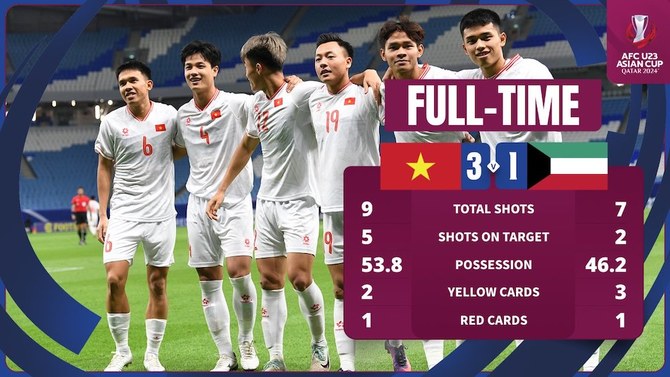
- Uzbekistan beat Malaysia 2-0 in the same group as the first round of matches concludes
DOHA: Vietnam defeated Kuwait 3-1 in the 2024 AFC U-23 Asian Cup as Group D games got underway in Qatar on Wednesday night.
The result meant Vietnam took the early lead in the fourth and final group of the 16-team tournament, with Uzbekistan, who beat Malaysia 2-0, sitting second in the table on goal difference. Kuwait and Malaysia, with zero points, are third and fourth respectively.
The second round of matches kick off in Group A on Thursday (April 18), with hosts Qatar taking on Jordan and Indonesia facing Australia.
Meanwhile, Saudi Arabia will return to action against Thailand on Friday before facing Iraq in their final Group C match on Monday (April 22).
The 2024 AFC U-23 Asian Cup sees 16 nations split into four groups of four teams, with the top two from each progressing to the quarterfinals. The competition also serves as a route to the Olympic Games in Paris this summer, with the winners of the two semifinals both securing automatic qualification.
The two losing semifinalists will contest third place, with the winners also booking a place in Paris, while the fourth-place finishers have a final chance with a play-off against an African qualifier.
Pakistan kick off T20 World Cup 2024 preparations with New Zealand series today
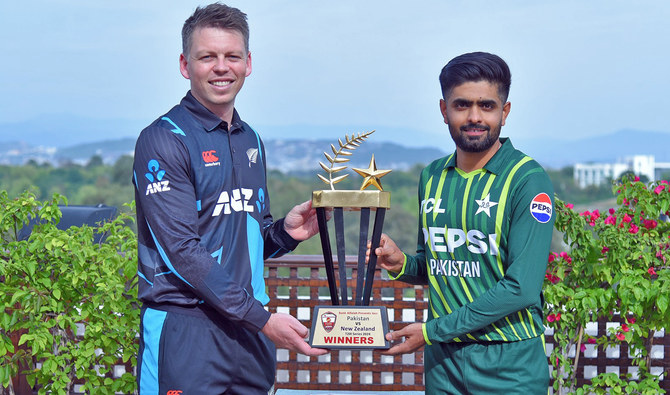
- Today’s match to see return of Mohammad Amir, Imad Wasim and Naseem Shah to Pakistan’s national squad
- Pakistan’s white-ball captain Babar Azam says team eager to express themselves as a unit in today’s match
ISLAMABAD: The Pakistan cricket team will kick off their preparations for the ICC World Cup 2024 by taking on New Zealand in the first match of the T20I series against the Black Caps in Rawalpindi today, Thursday.
Led by experienced all-rounder Michael Bracewell, New Zealand’s cricket team arrived in Pakistan last week to play the five-match T20I series from April 14-28. Rawalpindi will also host matches on Saturday and Sunday, while Lahore’s Qaddafi Stadium will be the stage for the remaining two matches next week on Thursday and Saturday.
This will be the third five-match series between the two sides inside a 12-month period. Last year, Pakistan and New Zealand drew the series at two-all in Pakistan, while New Zealand clinched the series 4-1 earlier at their home.
“This five-match T20I series holds a lot of importance for us as we look forward to preparing for the all-important mega-event,” Pakistan’s white-ball captain Babar Azam said during a news conference on Wednesday.
“We had a great fitness camp in Kakul and are looking forward to express ourselves as a unit.”
Pakistan have named uncapped Abrar Ahmed, Mohammad Irfan Khan and Usman Khan in the 17-player squad. Pacer Mohammad Amir and all-rounder Imad Wasim, who came back from retirement last month. are also back in the national squad.
The series will also mark fast bowler Naseem Shah’s return to the national squad, who last played for Pakistan in Asia Cup 2023 before suffering a shoulder injury. The injury proved to be a fatal blow for Pakistan, sidelining Shah from the ICC Men’s Cricket World Cup 2023 and tours of Australia and New Zealand.
Bracewell said he was excited to lead New Zealand on the Pakistan tour, adding that his team was raring to play good cricket against the hosts.
“Pakistan are formidable side at home and we’ll look to put challenges in their backyard,” he said.
The match is scheduled to begin at 7:30 p.m. Pakistan Standard Time.
Squads:
Pakistan — Babar Azam (captain), Abrar Ahmed, Azam Khan, Fakhar Zaman, Iftikhar Ahmed, Imad Wasim, Mohammad Abbas Afridi, Mohammad Rizwan, Mohammad Amir, Muhammad Irfan Khan, Naseem Shah, Saim Ayub, Shadab Khan, Shaheen Shah Afridi, Usama Mir, Usman Khan and Zaman Khan
New Zealand — Michael Bracewell (captain), Tom Blundell, Mark Chapman, Josh Clarkson, Jacob Duffy, Dean Foxcroft, Ben Lister, Cole McConchie, Jimmy Neesham, Will O’Rourke, Tim Robinson, Ben Sears, Tim Seifert, Ish Sodhi and Zak Foulkes.
Nadal loses to De Minaur in second round at Barcelona
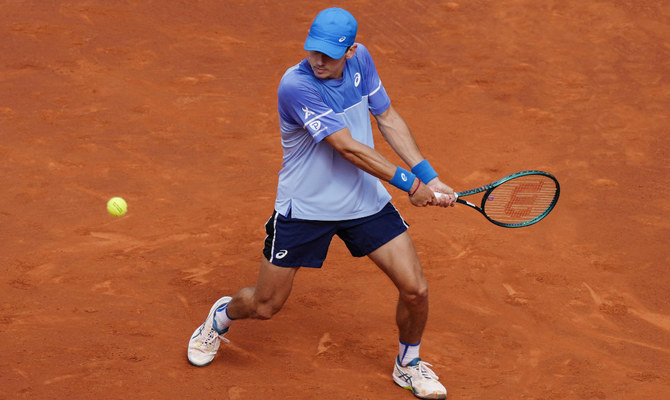
- Nadal again looked injury-free on Wednesday but was never in control against the in-form De Minaur, who picked up his second career win over Nadal
- Roberto Bautista Agut rallied to defeat Andrea Vavassori 4-6, 6-3, 6-1 to earn his 400th tour-level victory
BARCELONA, Spain: Rafael Nadal’s first tournament since January lasted only two matches with the Spaniard losing 7-5, 6-1 to Alex de Minaur at the clay-court Barcelona Open on Wednesday.
Nadal, back from an injury layoff, looked like his old self for brief moments in the second-round match but couldn’t keep up with the 11th-ranked De Minaur.
“The moment I lost the first set, the match was over,” Nadal said. “I can’t play a three-hour match right now. This wasn’t the place for me to give everything I have. We’ll see what happens in Paris. I want to be competitive there, that’s where I have to give it all.”
Nadal is a 14-time winner at the French Open, which begins next month. He said he will try to play at the Madrid Open next week but didn’t fully commit.
“I didn’t want to take any risks,” Nadal said. “The important thing here was to play and I played. To be on the court is great news.”
The 22-time Grand Slam champion had comfortably defeated 62nd-ranked Flavio Cobolli in straight sets in the first round on Tuesday in what was his first competitive match in more than three months.
Nadal again looked injury-free on Wednesday but was never in control against the in-form De Minaur, who picked up his second career win over Nadal.
It was only his fifth defeat at the Barcelona Open, a tournament he has won a record 12 times.
“It’s natural that this was probably my last match here,” Nadal said. “I really enjoyed playing here. It was unimaginable to win it 12 times.”
Nadal is returning from yet another injury layoff and hadn’t played since an exhibition match against Carlos Alcaraz in March. Before this week, he had played only three competitive matches this year — all in Brisbane in January — before skipping the Australian Open.
Nadal also withdrew from Monte Carlo, saying he his body wasn’t ready.
The 37-year old Nadal had hip surgery last summer and said 2024 will probably be his last year playing on tour.
BAUTISTA AGUT’S 400TH
Roberto Bautista Agut rallied to defeat Andrea Vavassori 4-6, 6-3, 6-1 to earn his 400th tour-level victory.
The 35-year-old Spaniard is the 13th active player with at least 400 ATP Tour wins.
“To me it’s just a number,” Bautista Agut said. “The important thing is that I’ve done great work over these years, that I’ve had a very consistent career, a career that I can feel proud of.”
OTHER RESULTS
Third-seeded Casper Ruud advanced with a 6-3, 6-4 win over Alexandre Muller, while sixth-seeded Ugo Humbert lost 6-4, 6-4 to Dusan Lajovic.
Ninth-seeded Nicolas Jarry lost 7-6 (5), 6-3 to qualifier Marco Trungelliti, and 14th-seeded Jordan Thompson got past Jaume Munar 6-4, 2-6, 6-4.







